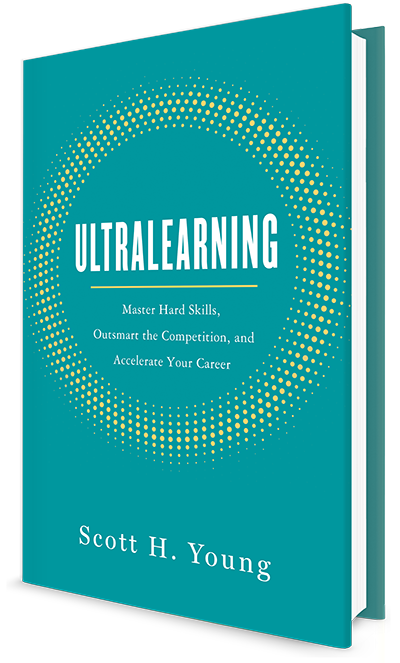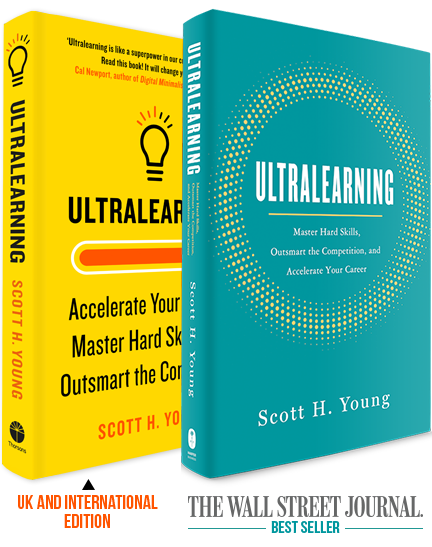The World Has Changed
A four-year degree used to be a guarantee for a great career. Now it’s barely a foot in the door.
Tuition prices have skyrocketed. The pace of change has accelerated. Technology has transformed how we access information, but instead of making us all geniuses, we mostly waste time looking at funny pictures of cats.
Ultralearning offers an alternative. Instead of going back to school, learn the hard skills to get into a new career or make yourself indispensable in your current work. Rather than struggle to keep up, learn to adapt and thrive. Stop wasting time, and instead give your life new meaning and confidence by getting good at something you’ve always wanted to learn.
What is Ultralearning?
Ultralearning is a strategy for aggressive, self-directed learning.
Self-directed means that, rather than waiting to pay for expensive tuition and tutors, you can take back control. Aggressive means that, instead of spending years at something without getting great, your limited time and effort are always directed towards what works.
To build this skill, we’ll start with the ultralearners themselves. People who have accomplished impressive learning feats, such as:
Benny Lewis, who quickly acquires new languages through fearless immersion.
Eric Barone, who became a millionaire nearly overnight after patiently acquiring all the skills to develop his own game.
Tristan de Montebello, who went from near-zero experience to a finalist for the World Champion of Public Speaking in seven months.
Nigel Richards, who became the French Scrabble World Champion, without speaking French.
Next we’ll go beyond individual projects and look at the science of learning. In doing so, we’ll resolve problems that vex students and professionals alike, such as:
- Why does it feel like a lot of what we learn in school is useless? (And what do you need to do to prevent your own projects from having the same fate?)
- Is feedback always helpful? (Hint: It’s not. What kind matters more, and this book will show you what to pay attention to and what to ignore.)
- Is being more focused always better for learning? And how do you avoid the urge to procrastinate when learning something new?
- What underlies the seemingly magical intuition of legendary geniuses such as Albert Einstein and Richard Feynman? (And can you approximate their magic with the right approach?)
Ultralearning interviews
Interview with James Clear
Interview with Barbara Oakley
Interview with Tristan de Montebello
Interview with Cal Newport
What Ultralearning will
Change in Your Life
With the book, you’ll be able to:
1. Learn new skills to accelerate your career.
Feeling stuck? Want to shift to a new job, role or career? ULTRALEARNING will give you the strategy to master the skills to get that raise, boost or promotion.
2. Rethink your current studies.
By applying the principles of ultralearning, you can spot weaknesses in what you’re doing now to learn, and make shifts towards the strategies that work before its too late.
3. Isolate what has worked for you in the past, so you can apply it for the future.
As you read ULTRALEARNING, you’ll also notice the factors that were present in the pursuits you’ve succeeded in the past. What’s more, you’ll also spot subtle weaknesses of your past projects which failed, so you can avoid repeating the same mistakes.
4. Create confidence where you’ve felt doubt before.
Always hated math? No ear for music or languages? Can’t draw anything but stick figures? By breaking down the principles that underlie all learning, you can rethink how you approach learning and be successful at things you hadn’t imagined possible.
5. Pick up a new language, instrument, pursuit or hobby.
What things have you always wanted to do, but been too scared to start? What if you could finally speak Spanish, play guitar, learn to paint, present or program? With the right strategy, you can learn anything, injecting your life with new confidence and possibilities.

What They’re Saying About ULTRALEARNING
Frequently Asked Questions
It’s true, I’ve written a lot about learning. Despite that, I made sure that ULTRALEARNING contained a lot of new stories and research I haven’t found elsewhere. The book is suitable for a complete beginner, but I also made sure to include ideas, stories and tactics that surprised me, even after having read and written about this subject for over a decade.
Regardless of whether you’ve never read anything I’ve written before, or whether you’ve read it all, there will be something new and useful for you in ULTRALEARNING.
Ultralearning is a strategy for aggressive, self-directed learning. It’s a strategy—meaning a choice about how to pursue learning to get results. It’s aggressive—meaning aimed at doing what works, even if it’s a little harder or intense. It’s self-directed—meaning you’re the one in control.
In addition, I found many subtle parallels between many actual ultralearning projects that are, on the surface, very different. Connecting these with the science on learning reveals that while learning languages, art, programming, physics and public speaking may seem unrelated they have deep similarities, that once understood, unlock the secret to learning anything.
In truth, my goal with ultralearning isn’t to have you blaze through a class or project in the shortest amount of time. Rather, it’s to deeply understand how learning works so you can achieve whatever goal you set.
Some of the ultralearners I met focus on meeting regular standards, but more quickly than others. This is useful if you’re looking to maximize your limited time to get a specific opportunity.
Other ultralearners were focused on mastery. Applying the same tools of effective learning, except instead of trying to rush through standard goals faster, they wanted to go far beyond what others expected of them. The choice is completely up to you.
I wrote this book mainly for people who aren’t students. Although students will benefit from the book, my intention was to write a book that would be a guide for people who don’t automatically see much of the work they do as learning.
Programmers, teachers, entrepreneurs, accountants, marketers, academics, nurses, musicians and other professionals were just a few of the people I had in mind when writing this book. If you work for a living, and you’d like to become indispensible, this book is for you.
Common sense, unfortunately, isn’t all that common. Therefore, a lot of the principles and strategies discussed in the book are widely underutilized, even if they make sense upon reflection.
However, in doing research for the book, even I was surprised at subtle ideas from cognitive science that undermine many of our expectations about learning. For instance:
- We expect that we’ll get better at our careers the more time we spend at them. Except this isn’t always true (or perhaps even the default!)
- The approach students think works best for learning is actually the wildly ineffective, due to subtle biases in our evaluation of self-knowledge.
- Why feedback can backfire, and what you should ignore.
- Major approaches to education, such as the common belief that school “teaches you how to think, not what to think” are based on ideas about learning that have been debunked for nearly a century.
- and many others…
Yes. We’ve already secured agreements for the book to be published in other languages and regions.



 I'm a Wall Street Journal bestselling author, podcast host, computer programmer and an avid reader. Since 2006, I've published weekly essays on this website to help people like you learn and think better. My work has been featured in The New York Times, BBC, TEDx, Pocket, Business Insider and more. I don't promise I have all the answers, just a place to start.
I'm a Wall Street Journal bestselling author, podcast host, computer programmer and an avid reader. Since 2006, I've published weekly essays on this website to help people like you learn and think better. My work has been featured in The New York Times, BBC, TEDx, Pocket, Business Insider and more. I don't promise I have all the answers, just a place to start.